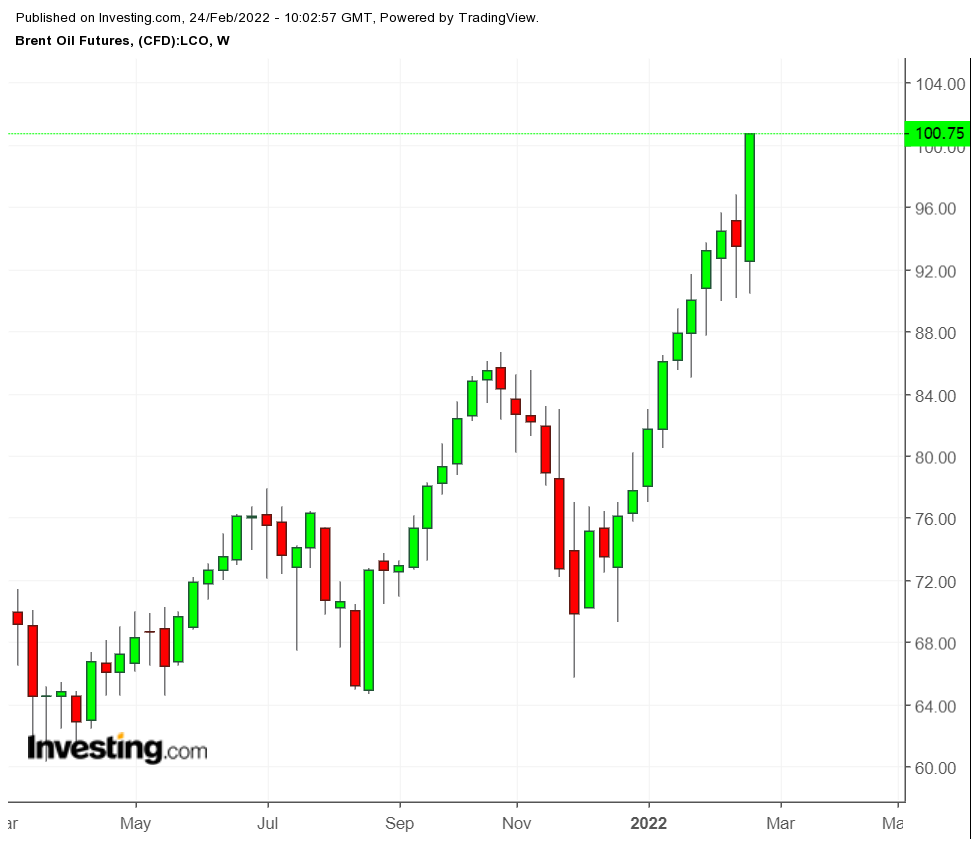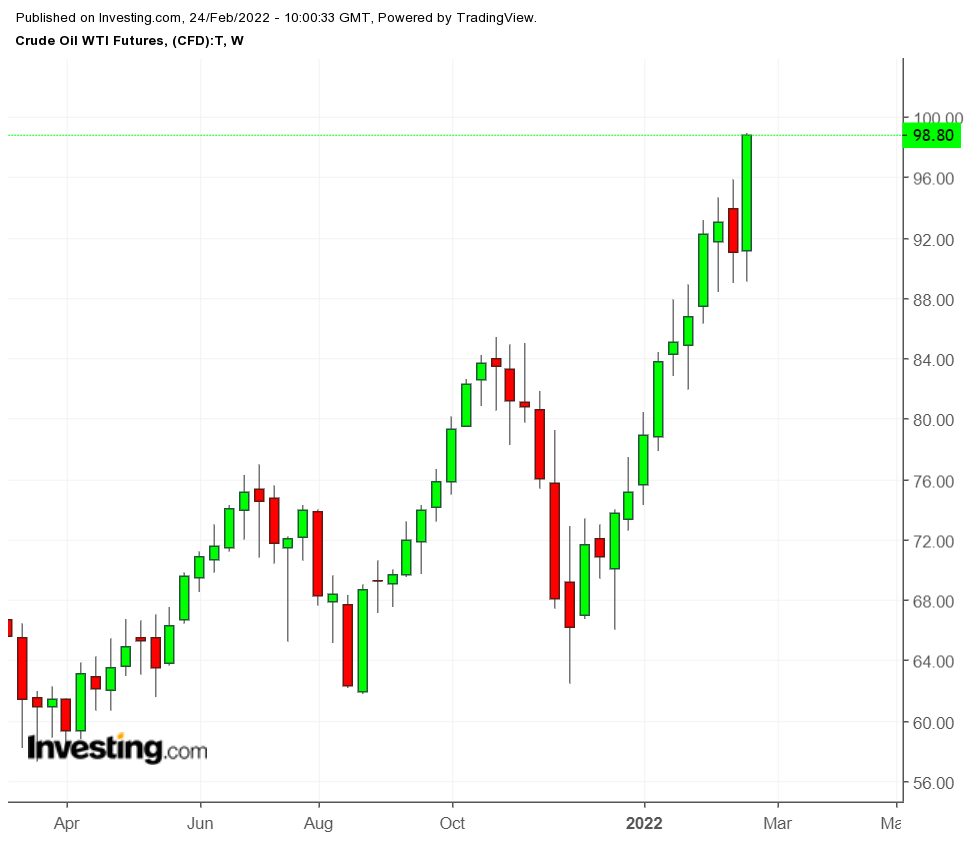As the crisis in Eastern Europe escalated this morning, with Russia invading Ukraine, the price of both Brent and WTI have moved toward $100, and will likely continue to push higher.

Given the rapidly changing situation, traders must sort through the rhetoric and politics to understand what factors are actually influencing the energy situation now.

They must also be able to identify potential long-term effects for oil and gas supplies. Readers should note that all information below is accurate as of the time of writing.
However, events on the ground and in markets remain highly volatile, meaning information can change quickly. As such, appropriate due diligence should be applied. Here are 3 key issues to note:
1. Nord Stream 2 Isn’t Cancelled
On Tuesday, Germany announced it does not intend to issue a certificate to permit the Nord Stream 2 pipeline to operate—yet. When this news broke, many media outlets portrayed the action as much more significant for energy supplies than it actually is. For example, CNN’s headline read "Germany halts Nord Stream 2 and Russia responds with a stark warning." Likewise, The New York Times wrote, "Germany puts a stop to Nord Stream 2, a key Russian natural gas pipeline."
Both of these headlines lead the reader to believe that Germany actually halted the flow of natural gas through the pipeline. This could cause traders to think that an energy crisis in western Europe is imminent. However, Nord Stream 2 isn’t even operational yet.
The pipeline is physically complete and ready to ship gas, but it isn’t in use. The company that owns the pipeline, Russia's Gazprom (MCX:GAZP), hasn’t yet complied with EU anti-competitive regulations. All Germany did on Tuesday was announce that it is putting its final certification of the pipeline on hold for the present.
However, Germany wasn’t expected to certify the pipeline until later this year anyway. No gas deliveries were affected by this move. Traders considering the short- and long-term impacts of this announcement about Nord Stream 2 should be wary of inaccurate headlines and reporting on energy issues.
It is possible that Gazprom, which also supplies natural gas to the original Nord Stream pipeline, may decide to curtail gas exports to Europe in order to pressure Germany and the EU to back down and certify Nord Stream 2. However, this is only a hypothetical situation.
2. Rhetoric Isn’t Action—Russian Oil And Gas Are Still Flowing
Speeches from U.S. President Biden and U.K. Prime Minister Johnson made strong statements of unity “in our opposition to Russian aggression” and portrayed the sanctions as a harsh "first barrage." Biden also warned Americans to expect "costs for us as well, here at home."
In his speech, Biden was referring to higher gasoline prices. It is true that gasoline prices are rising in the U.S., in part due to higher oil prices caused by uncertainty over the Russia/Ukraine situation. However, none of the sanctions announced so far have any impact on the oil trade other than among poorly informed speculators.
In fact, according to TankerTrackers.com, 700,000 barrels of Russian crude oil departed for the United States on Tuesday. Traders should remember that rhetoric from world leaders on both sides does not necessarily translate into action on the ground—or in the water.
When it comes to natural gas, the rhetoric also doesn’t match reality. For example, a senior U.S. official told reporters that Germany’s temporary halt to Nord Stream 2’s certification meant that the pipeline "will now go to waste" and that this is "a major turning point in the world’s energy independence from Russia."
This is simply not the case on the ground. We explored the Nord Stream 2 truth above, and there are also multiple pipelines that continue to send natural gas from Russia to various locations in Europe and China.
3. OPEC+ Isn’t Likely To Change Course
The Biden administration has made several attempts to convince Saudi Arabia and OPEC to increase oil production, but Saudi Arabia has remained resolute in its commitment not to raise production more than is permitted under the current OPEC+ deal.
In fact, OPEC’s Arab members, who actually have the spare capacity to increase production, have displayed uncharacteristic unity in their opposition to U.S. entreaties. At an industry conference in Saudi Arabia on Feb. 20, the oil ministers of Saudi Arabia, UAE, Iraq, and Kuwait all voiced similar sentiments committing to remain within their determined production quotas.
In fact, UAE oil minister Suhail Mazrouei said that he doesn’t "believe that the market is hugely under-supplied currently" and that geopolitical tensions "outside our hands" are acting on oil prices.
As OPEC+ continues to rebuff Washington’s pleas for more production, it is useful to remember that Russia is an active and powerful member of OPEC+. The other members of OPEC+ are motivated to keep the alliance with Russia intact.
We don’t know if this is the driving factor in the Arab producers’ current policies, but it surely plays a part. However, traders should keep in mind that OPEC+ is still meeting on a monthly basis and could change production policy if members have sufficient cause. OPEC+ meets next on Mar. 2.
Which stock should you buy in your very next trade?
AI computing powers are changing the stock market. Investing.com's ProPicks AI includes 6 winning stock portfolios chosen by our advanced AI. In 2024 alone, ProPicks AI identified 2 stocks that surged over 150%, 4 additional stocks that leaped over 30%, and 3 more that climbed over 25%. Which stock will be the next to soar?
Unlock ProPicks AI
